hold Politicians' Feet to the Fire - InsiderOnline.org
hold Politicians' Feet to the Fire - InsiderOnline.org
hold Politicians' Feet to the Fire - InsiderOnline.org
You also want an ePaper? Increase the reach of your titles
YUMPU automatically turns print PDFs into web optimized ePapers that Google loves.
Hold Politicians’<br />
<strong>Feet</strong> <strong>to</strong> <strong>the</strong> <strong>Fire</strong><br />
A Citizen’s Checklist for Assessing Government Actions<br />
By Malia Hill<br />
Visit insideronline.<strong>org</strong> | 25
Few people s<strong>to</strong>p <strong>to</strong> think about <strong>the</strong><br />
importance of <strong>the</strong> first three words of <strong>the</strong> U.S. Constitution:<br />
“We <strong>the</strong> people.” That simple phrase is <strong>the</strong><br />
heart of a revolution in <strong>the</strong> his<strong>to</strong>ry of governance<br />
and <strong>the</strong> key <strong>to</strong> American exceptionalism. We, <strong>the</strong><br />
people, grant rights <strong>to</strong> <strong>the</strong> government. Rights are<br />
not granted <strong>to</strong> us by a benevolent monarch (whose<br />
heirs could change <strong>the</strong>ir mind). The people of <strong>the</strong><br />
United States grant rights <strong>to</strong> <strong>the</strong> government, not<br />
<strong>the</strong> o<strong>the</strong>r way around—a fact that we emphasize<br />
by fur<strong>the</strong>r limiting <strong>the</strong> powers of <strong>the</strong> government<br />
through <strong>the</strong> first 10 amendments <strong>to</strong> <strong>the</strong> Constitution.<br />
In many ways, this vesting of power with <strong>the</strong><br />
people, ra<strong>the</strong>r than <strong>the</strong> government, also charges<br />
<strong>the</strong> people with <strong>the</strong> responsibility <strong>to</strong> keep <strong>the</strong>ir<br />
own checks on government action and expansion,<br />
demanding correction where necessary.<br />
Founding Principles<br />
Constraining <strong>the</strong> power of <strong>the</strong> government is a<br />
founding principle—perhaps <strong>the</strong> founding principle—<br />
of our country. So determined were <strong>the</strong> Founding<br />
Fa<strong>the</strong>rs <strong>to</strong> express clear limitations on <strong>the</strong> scope of<br />
federal power that <strong>the</strong>ir first changes <strong>to</strong> <strong>the</strong> Constitution<br />
were <strong>to</strong> clarify <strong>the</strong> things that <strong>the</strong> government<br />
was not allowed <strong>to</strong> do.<br />
Contrast this pattern, if you will, <strong>to</strong> <strong>the</strong> way that<br />
legislation proceeds in modern times, with nearly<br />
every focus on adding <strong>to</strong> <strong>the</strong> reach and power of<br />
<strong>the</strong> government, be it federal, state, or local. Judges<br />
squint at <strong>the</strong> Commerce Clause <strong>to</strong> try <strong>to</strong> find even<br />
broader interpretations <strong>to</strong> legitimize Congressional<br />
actions that go far beyond what <strong>the</strong> framers of <strong>the</strong><br />
Constitution must have imagined.<br />
But <strong>the</strong>re is a logic inherent in <strong>the</strong> principle of constraint<br />
and limitation, and nearly every o<strong>the</strong>r founding<br />
principle can be found in its wake. For example:<br />
Individual Liberty. Perhaps <strong>the</strong> one item on which<br />
nearly all Americans can agree, regardless of political<br />
persuasion, is <strong>the</strong> centrality of individual liberty <strong>to</strong> <strong>the</strong><br />
American philosophy of government. While we may<br />
dispute where <strong>the</strong> lines of liberty and responsibility<br />
cross, or where one person’s liberty should take a backseat<br />
<strong>to</strong> o<strong>the</strong>r more fundamental principles, we remain<br />
generally united on <strong>the</strong> principle that <strong>the</strong> government<br />
must not infringe upon certain intrinsic rights.<br />
Respect for Free Enterprise and <strong>the</strong> Free Market.<br />
So much of <strong>the</strong> his<strong>to</strong>ry of America’s Founding<br />
revolves around <strong>the</strong> clear desire <strong>to</strong> conduct one’s<br />
business free from government interference. We are,<br />
in essence, a country partially founded on <strong>the</strong> notion<br />
that taxation is a serious and generally undesirable<br />
matter. Yet, while <strong>the</strong>re is no shortage of defenders of<br />
individual liberty, <strong>to</strong>o few note that <strong>the</strong> free market is<br />
an extension <strong>the</strong>reof. After all, what good is personal<br />
freedom if it ends <strong>the</strong> moment you try <strong>to</strong> put a roof<br />
over your head or food on your table?<br />
Respect for Tradition, Family, and <strong>the</strong> Foundations<br />
of Our Society. Government should not<br />
attempt <strong>to</strong> engage in social engineering or undermine<br />
<strong>the</strong> family. This principle includes respect for both<br />
religious freedom and religious liberty, that difficult<br />
combination of rights that guarantee both our right<br />
<strong>to</strong> practice our religion and our freedom from government<br />
intrusion, denominational favoritism, or even<br />
policies that are hostile <strong>to</strong> religious groups or agencies.<br />
It also includes an understanding of <strong>the</strong> importance<br />
of societal mores, <strong>the</strong> unwritten traditions and<br />
practices that are more deeply ingrained than any law<br />
and operate as both <strong>the</strong> glue that <strong>hold</strong>s us <strong>to</strong>ge<strong>the</strong>r<br />
and <strong>the</strong> oil that allows our society <strong>to</strong> function.<br />
Judicial Restraint. The courts should practice<br />
restraint in <strong>the</strong> same way that <strong>the</strong> legislative and<br />
executive branches should. This restraint includes<br />
staying within <strong>the</strong>ir role as an interpreter of law and<br />
not expanding <strong>the</strong>ir power <strong>to</strong> create legislation from<br />
<strong>the</strong> bench.<br />
Executive Restraint. While <strong>the</strong> judicial branch<br />
has received more attention for its forays in<strong>to</strong> legislative<br />
action, <strong>the</strong> executive branch has been quietly<br />
growing and creating its own body of law based on <strong>the</strong><br />
regula<strong>to</strong>ry power of <strong>the</strong> executive agency. Not only<br />
does this practice muddy <strong>the</strong> waters of accountability,<br />
but it deprives <strong>the</strong> people of <strong>the</strong>ir usual avenues of<br />
26 | The Insider Spring 2012
edress in legislative matters. The executive’s proper<br />
role as enforcer of <strong>the</strong> law carries with it a position<br />
of significant public trust (especially as it wields <strong>the</strong><br />
force—<strong>the</strong> gun—that demands adherence <strong>to</strong> <strong>the</strong> law).<br />
Therefore, we must be as wary of efforts <strong>to</strong> expand<br />
executive power as with efforts <strong>to</strong> expand <strong>the</strong> power<br />
of all o<strong>the</strong>r branches of government.<br />
Legislative Restraint. As with <strong>the</strong> o<strong>the</strong>r branches,<br />
it is important for <strong>the</strong> legislature not <strong>to</strong> overstep its<br />
constitutional bounds. While o<strong>the</strong>r branches may<br />
dabble in legislation, <strong>the</strong> way that we identify a lack of<br />
restraint on <strong>the</strong> part of <strong>the</strong> legislature is by observing<br />
that <strong>the</strong>re is <strong>to</strong>o much legislation: laws passed without<br />
a sense of accountability or without a practical<br />
method of enforcement; onerous laws that place <strong>to</strong>o<br />
great a burden on individuals or businesses; laws that<br />
meddle in <strong>the</strong> domain of <strong>the</strong> family, parental rights, or<br />
matters of individual liberty; and laws that abuse <strong>the</strong><br />
People’s trust as well as <strong>the</strong>ir treasury. The list goes<br />
on and on.<br />
What do we do when <strong>the</strong> branches of government<br />
fail <strong>to</strong> check each o<strong>the</strong>r or limit assaults on liberty?<br />
Ultimately, it is <strong>the</strong> responsibility of <strong>the</strong> citizenry <strong>to</strong><br />
keep watch on <strong>the</strong>m and demand responsibility and<br />
accountability. That, of course, raises <strong>the</strong> question of<br />
how <strong>to</strong> discern <strong>the</strong> difference between <strong>the</strong> responsible<br />
and irresponsible government action. The following<br />
is a guide that helps identify how well <strong>the</strong> measure<br />
in question fares in a point-by-point checklist that<br />
evaluates <strong>the</strong> measure in relation <strong>to</strong> fundamental<br />
principles of good, constitutional government.<br />
Government Action Checklist<br />
In order <strong>to</strong> evaluate pending legislation or o<strong>the</strong>r<br />
government actions, ask <strong>the</strong>se questions:<br />
Is <strong>the</strong> action necessary?<br />
It is as<strong>to</strong>unding how often <strong>the</strong> inquiry could end<br />
after this simple question. A significant amount of<br />
legislation and o<strong>the</strong>r government action is redundant,<br />
spurred by vanity or special interests, incapable<br />
of properly addressing <strong>the</strong> problem it seeks <strong>to</strong> solve,<br />
or o<strong>the</strong>rwise simply unnecessary.<br />
Has <strong>the</strong>re been a realistic and unbiased<br />
examination of <strong>the</strong> probable consequences of <strong>the</strong><br />
action, including social, cultural, and financial<br />
consequences?<br />
Taking responsibility for legislation means knowing<br />
as much as possible about <strong>the</strong> probable results<br />
of that measure as well as understanding <strong>the</strong> law<br />
of unintended consequences. While it may not be<br />
Visit insideronline.<strong>org</strong> | 27
possible <strong>to</strong> know every conceivable cause/effect scenario,<br />
an effort must be made <strong>to</strong> evaluate <strong>the</strong> <strong>to</strong>tal<br />
impact of <strong>the</strong> measure in question.<br />
What will <strong>the</strong> action cost and who will pay?<br />
These questions are obvious ones but are not<br />
necessarily easy <strong>to</strong> get good answers for—a sign, of<br />
course, that <strong>the</strong> measure in question is very troubling<br />
and will likely fail a number of o<strong>the</strong>r items on this list.<br />
Has <strong>the</strong>re been a serious and unbiased examination<br />
of <strong>the</strong> constitutionality of <strong>the</strong> action?<br />
The legislature should not shirk its own responsibility<br />
<strong>to</strong> <strong>the</strong> Constitution by passing off questions<br />
of legality <strong>to</strong> <strong>the</strong> courts. Not only is this practice one<br />
route <strong>to</strong> <strong>the</strong> slow erosion of our basic rights, but it also<br />
wastes taxpayer funds at every level of government.<br />
Is <strong>the</strong> proposed law enforceable?<br />
A particular vulnerability of many noble-sounding<br />
laws is that <strong>the</strong>y are not enforceable. Enforceability<br />
should be considered for every proposed law. The<br />
question is not only whe<strong>the</strong>r it is possible <strong>to</strong> enforce<br />
<strong>the</strong> proposed measure, but also whe<strong>the</strong>r it is practical<br />
<strong>to</strong> do so given <strong>the</strong> resources available.<br />
Will <strong>the</strong> action’s results be evaluated<br />
objectively?<br />
The rubber meets <strong>the</strong> road when we ask whe<strong>the</strong>r<br />
<strong>the</strong> consequences of <strong>the</strong> legislation have been thoroughly<br />
considered. If <strong>the</strong>re is no interest in objectively<br />
measuring whe<strong>the</strong>r <strong>the</strong> action meets stated goals, <strong>the</strong>n<br />
one must wonder what <strong>the</strong> true purpose of <strong>the</strong> law is.<br />
Who is responsible for implementing, enforcing,<br />
and evaluating <strong>the</strong> legislation?<br />
Be especially wary of those measures that require<br />
new agencies, divisions, or departments in order <strong>to</strong> be<br />
implemented. The natural tendency of government<br />
bureaucracies is <strong>to</strong> grow, and <strong>the</strong>y’re very hard <strong>to</strong> cut<br />
back once <strong>the</strong>y’ve been created. And as government<br />
grows, individual rights shrink.<br />
Does <strong>the</strong> action infringe upon any individual<br />
rights or disrupt important societal foundations?<br />
This question concerns not only infringement of<br />
basic constitutional rights (like religious liberty or<br />
speech), but <strong>the</strong> maintenance of respect for societal<br />
foundations and mores, such as <strong>the</strong> right of parents<br />
<strong>to</strong> raise <strong>the</strong>ir children according <strong>to</strong> <strong>the</strong>ir beliefs. Such<br />
rights must be balanced against issues of public policy<br />
and safety, but <strong>the</strong> governmental interest must be a<br />
strong one <strong>to</strong> justify state intervention.<br />
Does <strong>the</strong> action create a burden for business or<br />
infringe unnecessarily upon free enterprise?<br />
The concern here is not just about maintaining<br />
public policies that will benefit <strong>the</strong> economy, but<br />
also about a more fundamental notion: that <strong>the</strong> free<br />
market is an essential foundation of individual liberty<br />
and <strong>the</strong>refore <strong>the</strong> government should keep free<br />
enterprise free.<br />
Does <strong>the</strong> proposed law create accountability<br />
for those responsible for passing and enforcing<br />
it, ultimately reserving power <strong>to</strong> reverse it in <strong>the</strong><br />
hands of <strong>the</strong> voters?<br />
When every o<strong>the</strong>r safeguard fails, <strong>the</strong> one remaining<br />
protection for <strong>the</strong> people is that <strong>the</strong>y can ultimately<br />
<strong>hold</strong> <strong>the</strong>ir elected representatives accountable and<br />
<strong>the</strong>reby find a way <strong>to</strong> address <strong>the</strong>ir errors. In addition,<br />
recent his<strong>to</strong>ry has demonstrated that a lack of<br />
willingness <strong>to</strong> enforce laws already in existence has<br />
exacerbated existing problems. Laws should include<br />
accountability measures for those required <strong>to</strong> enforce<br />
<strong>the</strong>m so as <strong>to</strong> ensure that <strong>the</strong>y are involved in <strong>the</strong><br />
evaluation of <strong>the</strong> feasibility of <strong>the</strong> legislation and do<br />
not “pass <strong>the</strong> buck” on <strong>the</strong>ir own responsibility once<br />
a law is passed.<br />
Ms. Hill is a policy analyst at <strong>the</strong> Grassroot Institute<br />
of Hawaii. This article is adapted from an article<br />
previously published by <strong>the</strong> Grassroot Institute and<br />
available at www.grassrootinstitute.<strong>org</strong>/system/<br />
attachments/85/InPursuit_No2.pdf.<br />
28 | The Insider Spring 2012


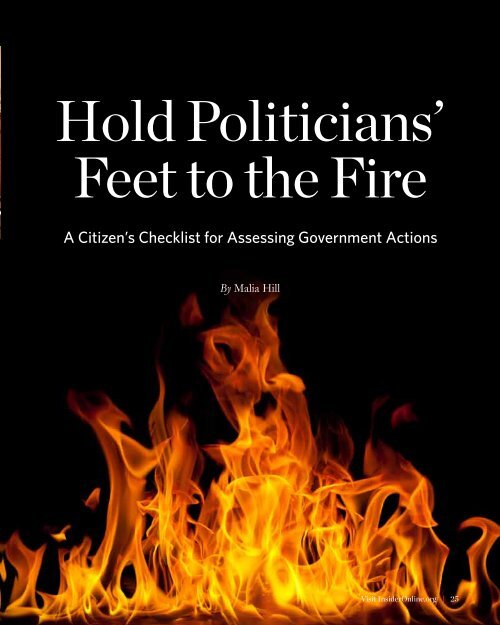
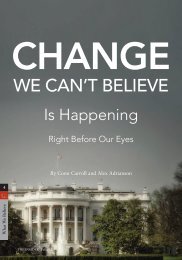
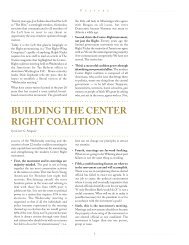
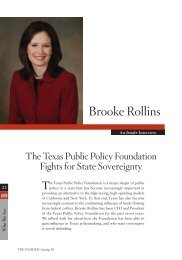
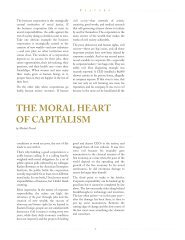
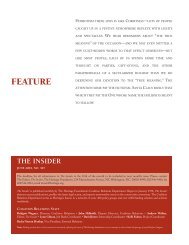
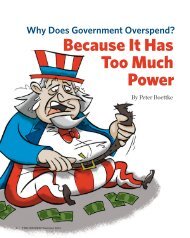
![Roads to Serfdom [PDF] - InsiderOnline.org](https://img.yumpu.com/23433549/1/182x260/roads-to-serfdom-pdf-insideronlineorg.jpg?quality=85)
![Federalism: Statement of Principles [PDF] - InsiderOnline.org](https://img.yumpu.com/21889681/1/182x260/federalism-statement-of-principles-pdf-insideronlineorg.jpg?quality=85)